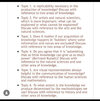hey guys, this is my first post. hopefully you see it.
anyways, my claim is that yes, truth is subjective. Here is what i used to convince myself and pls feel free to see if i made any mistakes in my reasoning (i def did cuz no way is this true). thx
premise 1: to evaluate the truth value of a claim you must adopt a "world" to view the claim from (e.g 1+1 =2 is True if 1,+,=,2 are defined the way they usually are, and 1+1 != 2 if + is defined differently so there are 2 different "world" in this example).
premise 2: there are multiple "worlds" to view each claim from (language can be used to accomplish this).
conclusion: therefore the truth value of a statement is subjective to the "world" you are viewing it from.
so "truthful" claims are just claims the humans agreed upon to be true.
anyways, my claim is that yes, truth is subjective. Here is what i used to convince myself and pls feel free to see if i made any mistakes in my reasoning (i def did cuz no way is this true). thx
premise 1: to evaluate the truth value of a claim you must adopt a "world" to view the claim from (e.g 1+1 =2 is True if 1,+,=,2 are defined the way they usually are, and 1+1 != 2 if + is defined differently so there are 2 different "world" in this example).
premise 2: there are multiple "worlds" to view each claim from (language can be used to accomplish this).
conclusion: therefore the truth value of a statement is subjective to the "world" you are viewing it from.
so "truthful" claims are just claims the humans agreed upon to be true.


